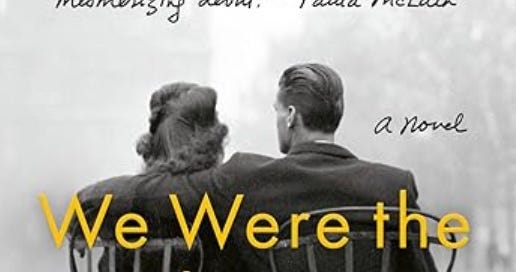BookLife Review by Carol O'Day: We Were the Lucky Ones (Georgia Hunter, author)
World War II Poland, 193901945, Jewish family, adult siblings, labor camps, military conscription, underground resistance, European diaspora, Brazilian refugees, reunion
BookLife Review by Carol O’Day: We Were the Lucky Ones (Georgia Hunter, author)
In 1939 Poland, the Kurc family gathers together weekly for a Friday evening Shabbat dinner, often followed by piano music around the family piano. There are five siblings-one of the five lives abroad in France. The four local adult (or nearly adult) siblings adore their loving family.
After the annexation of Austria by Germany in 1938, and Germany’s invasion of Czechoslovakia in March of 1939, rumors of further aggression by Germany and possible armed conflict generate unrest in Poland and elsewhere in Europe. The Kurc family does its best to preserve normalcy by holding their family close and remaining and true to their Jewish traditions. However, theSeptember 1st invasion of Poland by Germany dashes hopes that Poland can avoid war, yet Sol and Nechuma resist the popular decision to flee Poland. For a while, they continue to operate their textile and garment business, and resolutely hold Shabbat dinners to gather their children and granddaughter near to them.
History asserts itself and before long, Germany occupies Poland, including Radom. Apartments are seized, including the Kurcs’. Many of their possessions are seized and they are assigned a small apartment elsewhere while German officers occupy their home. Jewish citizens are compelled to join local labor crews and undertake menial jobs assigned by the German military or face deportation to labor (prison) camps. Sol and Nechuma are sent to work in a cafeteria. Son-in-law Selim is a physician and is conscripted to the military; his wife, Mila, is assigned to work in a German uniform and garment factory. Eldest son Genek and his wife, Herta, are arrested and sent to a Siberian lumber camp where they work in frigid conditions for over a year. Son Jakob is conscripted by the Polish Army and sent to Lodz, Poland to fight. His fiance, Bella, later escapes across the front lines to join him there and they are secretly married. Addy remains stranded in France, unable to travel back to Poland safely and is then drafted to serve in the Polish Army division in France.
The horrors of World War II in Poland creep into what was this family’s very ordinary and normal life. They are dispersed across Europe, living in constant thrumming terror of a regime that grows increasingly focused on exterminating Jews. At first the family, like much of the population of Europe, refuses to believe that the German aggressors would succeed and that they would once again face a world war only three short decades after the decimation experienced in World War I. Yet, as the War thunders into their town, the horrors mount. The family undertakes tremendous risks and exercises extraordinary fortitude and bravery to remain alive, to protect each other, to identify places of relative safety, to orchestrate daring travel and escapes and to persist in their inviolable determination to survive and reunite. They escape labor camps, outwit death squads, crawl through muddy fields to cross enemy lines, and literally hike over the Swiss Alps from Austria into Italy.
We Were the Lucky Ones is all the more remarkable because it is based on the true story of the experience of the author’s grandfather, represented by Addy in this story. The Kurc family began in Radom, Poland. Over the course of the war and in its immediate aftermath, Jewish families struggled to find safe places to live. Members of their family were sent or relocated to France, Tel Aviv, other areas of Poland, America and ultimately to Rio de Janeiro, Brazil. Addy fled to Brazil from Europe, in a months long journey at sea, after he was released from his Polish army unit. There he continued his efforts to locate his family and determine if any of them had survived. It was an era long before computers or the internet, and the telephone was still a novelty and a luxury.
The author highlights the roles of the international Red Cross, the Hebrew Immigrant Aid Society and the American Jewish Joint Distribution Committee in reuniting Jewish and other displaced families after the war. While the Kurc family lost cousins, neighbors and countless friends, including most of Sol and Nechuma’s extended family and the families of their daughter-in-law and both sons-in-law, that their nuclear family and their spouses all survived is miraculous. We Were the Lucky Ones is a harrowing story, but one of hope and redemption.
Please support BookLife: Reviews for Readers and independent book sellers by purchasing We Were the Lucky Ones using the Bookshop.org link below.





